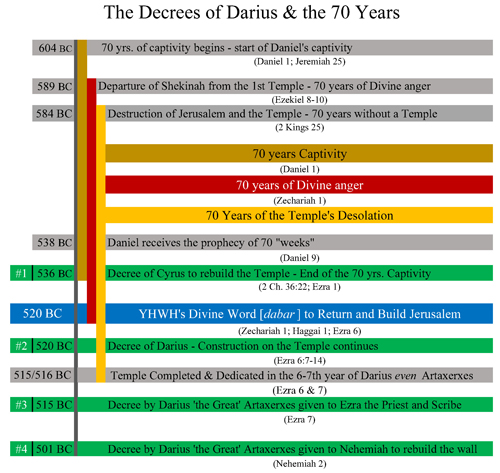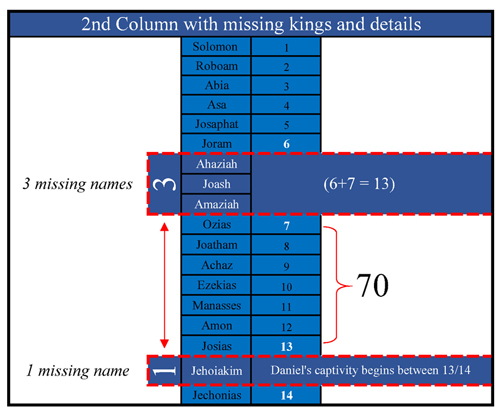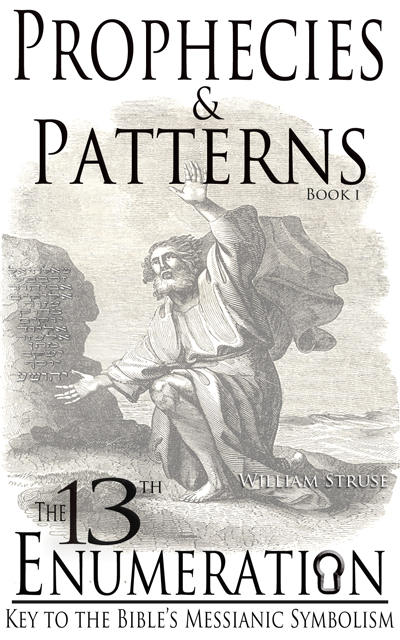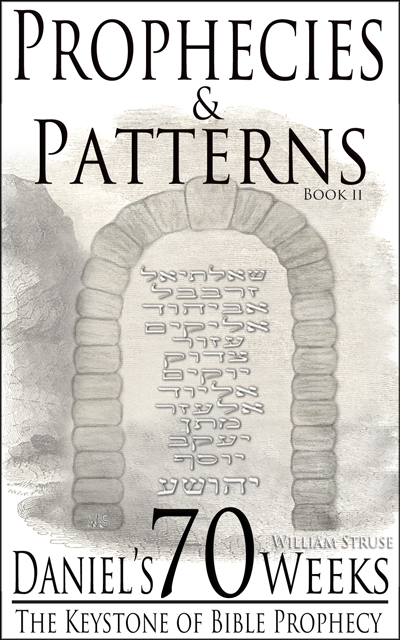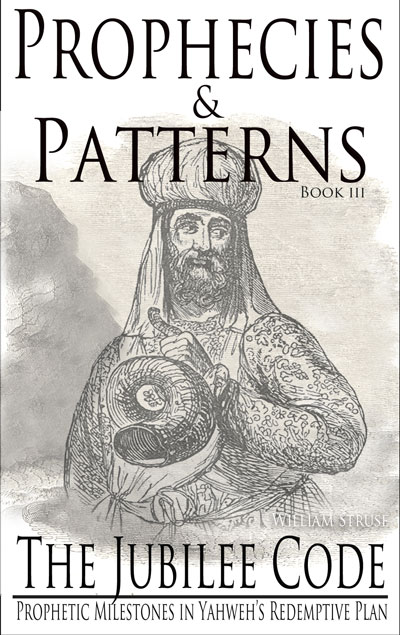 If you were the sovereign of this world for a day and you had a message for a generation 2500 years in the future, a message so important that their very lives depended upon it, how would you go about ensuring that they got the message?
If you were the sovereign of this world for a day and you had a message for a generation 2500 years in the future, a message so important that their very lives depended upon it, how would you go about ensuring that they got the message?
- Would you give this message yourself?
- would the message have credible witnesses to support its authenticity?
- Would the message have a clear date time stamp which could be historically verified?
I think most of us would agree, that at a minimum, the answers would be yes to the above three questions.
Now let’s take these questions one step further. If YHWH, the sovereign of this world, wanted to ensure that a future generation would know and understand, 2500 years in the future, the date He would send His son to redeem mankind, would He have given that message Himself or instead deferred that honor to a gentile king in one of His kingdoms?
And one final question.
If your life or the life of one of your loved ones depended upon you deciphering a 2500 year old message, sent to you from the past, whose word would you choose to help you understand this important message, a secular Persian king or the word of the living God of the Bible?
* * *
The past several weeks, in our efforts to determine who gave the decree to “restore and build Jerusalem”, that pivotal event which began the prophecy of 70 Weeks, we have looked at the decrees of four secular Persian kings.
This week I’d like to share with you a fifth decree which is almost universally ignored by Biblical scholars when investigating the 70 Weeks prophecy of Daniel 9. Shockingly, this decree was given by YHWH, the living |God of the Bible, and it is a decree which was witnessed by two prophets as well as the most influential priest and scribe of the 2nd temple era. Further, it is a decree that can be dated in secular history with a degree of certainty equal to or greater than any of the four Persian decrees we have looked at so far.
Today I hope you enjoy the adventure as we will explore the divine “commandment to restore and build Jerusalem”.
* * *
The Fifth Decree
“Therefore thus saith the Lord; I am returned to Jerusalem with mercies: my house shall be built in it, saith the Lord of hosts, and a line shall be stretched forth upon Jerusalem.” Zechariah 1:16
We started our investigation of Daniel 9:25 and the “commandment to restore and build” in an earlier blog post by looking at the Hebrew words dabar and shuwb. These two words offered a different perspective on the verse and allowed us to consider the possibility that this so-called “commandment” might in fact be a dabar or word from YHWH, the living God of the Bible. In the subsequent posts we looked at Persian chronology in the context of the four Persian decrees that scholars have at various times claimed represented the “commandment” of Daniel 9:25—ultimately concluding that none of these four decrees qualifies to begin our countdown to the Messiah. This review of Persian chronology has been invaluable to our understanding of the events that led to resettlement of Jerusalem and the reestablishment of the temple service.
One last time let’s look at these events, but this time let’s consider them with the words of YHWH, the living God of the Bible, as our focus.
YHWH, Nebuchadnezzar, and the 70 Years’ Captivity
I have studied the prophecy of Daniel 9 for years. To this day I’m still struck by how singlemindedly I looked for a secular decree or commandment as the fulfillment of Daniel 9:25 without any consideration for what impact YHWH’s own actions might have in the equation. I still shake my head in wonder at how I ignored the evidence.
Remember, these events all started in the third year of King Jehoiakim of Judah when YHWH caused Nebuchadnezzar to take the people of Judah captive, thus beginning the 70 years prophesied by Jeremiah. Daniel 1:1–6 informs us that a young man named Daniel was taken captive at this time as well. This very same young man, nearly 70 years later, would record the prophecy of 70 sevens, the most important messianic prophecy in the Bible.
In the third year of the reign of Jehoiakim king of Judah came Nebuchadnezzar king of Babylon unto Jerusalem, and besieged it. And the Lord gave Jehoiakim king of Judah into his hand, with part of the vessels of the house of God: which he carried into the land of Shinar to the house of his god; and he brought the vessels into the treasure house of his god . . . Now among these were of the children of Judah, Daniel, Hananiah, Mishael, and Azariah. (Daniel 1:1–6, emphasis mine)
Notice in this next passage how YHWH makes it clear that the people’s sins had polluted His house which He had set apart in Jerusalem, and because of this sin His righteous anger was come upon them. Indeed, the next several verses show that as a result of that sin, YHWH caused Solomon’s temple to be destroyed and the walls of Jerusalem to be broken down. As you read the following passage from 2 Chronicles 36, keep in mind Daniel 9:1–23 and how Daniel’s prayer to YHWH came out of this very context.
Moreover all the chief of the priests, and the people, transgressed very much after all the abominations of the heathen; and polluted the house of YHWH which he had hallowed in Jerusalem.
And YHWH God of their fathers sent to them by his messengers, rising up betimes, and sending; because he had compassion on his people, and on his dwelling place: but they mocked the messengers of God, and despised his words, and misused his prophets, until the wrath of YHWH arose against his people, till there was no remedy.
Therefore he brought upon them the king of the Chaldees, who slew their young men with the sword in the house of their sanctuary, and had no compassion upon young man or maiden, old man, or him that stooped for age: he gave them all into his hand. And all the vessels of the house of God, great and small, and the treasures of the house of YHWH, and the treasures of the king, and of his princes; all these he brought to Babylon. And they burnt the house of God, and brake down the wall of Jerusalem, and burnt all the palaces thereof with fire, and destroyed all the goodly vessels thereof.
And them [i.e. Jehoiakim, Daniel, Ezekiel, etc,] that had escaped from the sword carried he away to Babylon; where they were servants to him and his sons until the reign of the kingdom of Persia: to fulfil the word of YHWH by the mouth of Jeremiah, until the land had enjoyed her sabbaths: for as long as she lay desolate she kept sabbath, to fulfil threescore and ten years.
Now in the first year of Cyrus king of Persia, that the word of YHWH spoken by the mouth of Jeremiah might be accomplished, YHWH stirred up the spirit of Cyrus king of Persia, that he made a proclamation throughout all his kingdom. (2 Chronicles 36:14–22, emphasis mine)
Israel’s Sin Caused the Destruction of the Temple and Jerusalem
It was because of Israel’s sins and transgressions that the people of Judah and Jerusalem were carried away captive, the temple was destroyed, and the walls of Jerusalem were broken down. Now, let’s fast-forward nearly 70 years to the point when the prophecy of 70 sevens was given. Let’s read this passage one last time with our perspective sharpened by what we’ve learned in the preceding chapters.
In the first year of Darius the son of Ahasuerus, of the seed of the Medes, which was made king over the realm of the Chaldeans; in the first year of his reign I Daniel understood by books the number of the years, whereof the word of YHWH came to Jeremiah the prophet, that he would accomplish seventy years in the desolations of Jerusalem.
And I set my face unto the Lord God, to seek by prayer and supplications, with fasting, and sackcloth, and ashes: and I prayed unto YHWH my God, and made my confession, and said, O YHWH, the great and dreadful God, keeping the covenant and mercy to them that love him, and to them that keep his commandments; we have sinned, and have committed iniquity, and have done wickedly, and have rebelled, even by departing from thy precepts and from thy judgments: neither have we hearkened unto thy servants the prophets, which spake in thy name to our kings, our princes, and our fathers, and to all the people of the land.
O Lord, righteousness belongeth unto thee, but unto us confusion of faces, as at this day; to the men of Judah, and to the inhabitants of Jerusalem, and unto all Israel, that are near, and that are far off, through all the countries whither thou hast driven them, because of their trespass that they have trespassed against thee. O Lord, to us belongeth confusion of face, to our kings, to our princes, and to our fathers, because we have sinned against thee. To the Lord our God belong mercies and forgivenesses, though we have rebelled against him; neither have we obeyed the voice of YHWH our God, to walk in his laws, which he set before us by his servants the prophets.
Yea, all Israel have transgressed thy law, even by departing, that they might not obey thy voice; therefore the curse is poured upon us, and the oath that is written in the law of Moses the servant of God, because we have sinned against him. And he hath confirmed his words, which he spake against us, and against our judges that judged us, by bringing upon us a great evil: for under the whole heaven hath not been done as hath been done upon Jerusalem . . .
O Lord, according to all thy righteousness, I beseech thee, let thine anger and thy fury be turned away from thy city Jerusalem, thy holy mountain: because for our sins, and for the iniquities of our fathers, Jerusalem and thy people are become a reproach to all that are about us. Now therefore,
O our God, hear the prayer of thy servant, and his supplications, and cause thy face to shine upon thy sanctuary that is desolate, for the Lord’s sake.
O my God, incline thine ear, and hear; open thine eyes, and behold our desolations, and the city which is called by thy name: for we do not present our supplications before thee for our righteousnesses, but for thy great mercies. O Lord, hear; O Lord, forgive; O Lord, hearken and do; defer not, for thine own sake, O my God: for thy city and thy people are called by thy name. (Daniel 9:1–20 emphasis mine)
Desolation Because of Sin
Daniel 9:1–20 confirms exactly the cause of Judah’s captivity and the destruction of Jerusalem as described in 2 Chronicles 36. By both accounts, the defining evidence of YHWH’s anger was His desolate sanctuary. The bottom line was that YHWH would not or could not dwell among His people because of their sins, and without YHWH’s house and His presence within it, Jerusalem was just a hollow shell.
So we find Daniel in chapter 9, an ancient man, a man beloved of YHWH, in prayer for his people and the desolate sanctuary of his God. In answer to Daniel’s prayer, a prayer that finds its genesis in the events described in 2 Chronicles 36, the angel Gabriel is dispatched with a prophecy that lays out the future of Daniel’s people and the city of Jerusalem, the one place on this earth where YHWH chose to meet with mankind.
The message of YHWH sent through the angel Gabriel, that famous prophecy of 70 sevens, reassures Daniel that reconciliation, redemption, and righteousness are coming and that Jerusalem will once again be restored. By many accounts it was just a couple of years after Daniel was given this prophecy that YHWH began to set in motion His plan by first raising up Cyrus as “king of Babylon” and then by prompting him to allow the children of Israel to return to Jerusalem and rebuild YHWH’s desolate sanctuary.
Now in the first year of Cyrus king of Persia, that the word of YHWH by the mouth of Jeremiah might be fulfilled, YHWH stirred up the spirit of Cyrus king of Persia, that he made a proclamation throughout all his kingdom, and put it also in writing, saying, Thus saith Cyrus king of Persia, YHWH God of heaven hath given me all the kingdoms of the earth; and he hath charged me to build him an house at Jerusalem, which is in Judah. Who is there among you of all his people? his God be with him, and let him go up to Jerusalem, which is in Judah, and build the house of YHWH God of Israel, (he is the God,) which is in Jerusalem. (Ezra 1:1–3)
Thus saith YHWH, thy redeemer . . . that confirmeth the word of his servant, and performeth the counsel of his messengers; that saith to Jerusalem, Thou shalt be inhabited; and to the cities of Judah, Ye shall be built . . . that saith of Cyrus, He is my shepherd, and shall perform all my pleasure: even saying to Jerusalem, Thou shalt be built; and to the temple, Thy foundation shall be laid. (Isaiah 44:24–28)
Events Are Reversed
Notice the focus and order of the events described in the above passages. Israel’s sins brought about the captivity of Daniel’s people. Shortly thereafter, YHWH departed from His sanctuary, and this departure brought about the destruction of the temple and finally the destruction of the city of Jerusalem and its defenses. Keep in mind that it was the destruction of the temple that marked the de facto destruction of Jerusalem.
Now, 70 years later, the events are reversed. Cyrus’s decree allowed Israel to return to Jerusalem and rebuild the city. Initially those rebuilding efforts focused on the very heart of the city, that is, YHWH’s desolate sanctuary. The entire context of these passages makes it clear that in the eyes of YHWH, the returning Israelites, and the surrounding nations, rebuilding YHWH’s house was rebuilding Jerusalem.
Short-Lived Enthusiasm
Unfortunately the enthusiasm of Joshua the high priest, Zerubbabel the governor, and the other repatriated Israelite captives for building the temple didn’t last long. As we learned in the previous chapters, the harassment of their enemies and their own personal interests caused them to abandon their efforts to rebuild the temple. For the next sixteen years Israel neglected the house of YHWH and instead expended their efforts on their own dwellings and on intermingling with the women of the surrounding nations.
YHWH Intervenes
Doesn’t it seem that YHWH often intervenes in the affairs of men just when all other options are exhausted, when all hope is lost and we have nothing but Him to look to? Well, I think this is what happened at this point in Israel’s history. After such glorious beginnings under the decree of Cyrus, the dreams of the early Jewish repatriates were all but squelched. It had been nearly two decades and the temple was still not built, Jerusalem was defenseless, and the people lived scattered amongst their enemies in their own land.
Then something changed. YHWH’s divine anger had run its course. In the fullness of His eternal plan, He set events in motion once again. At this pivotal point in Israel’s history, the word of YHWH went forth, and He commanded the people to “return and build Jerusalem”:
In the second year of Darius the king, in the sixth month, in the first day of the month, came the word [dabar] of YHWH by Haggai the prophet unto Zerubbabel the son of Shealtiel, governor of Judah, and to Joshua the son of Josedech, the high priest, saying, Thus speaketh YHWH of hosts, saying, This people say, The time is not come, the time that YHWH’s house should be built.
Then came the word [dabar] of YHWH by Haggai the prophet, saying, Is it time for you, O ye, to dwell in your cieled houses, and this house lie waste? Now therefore thus saith YHWH of hosts; Consider your ways. Ye have sown much, and bring in little; ye eat, but ye have not enough; ye drink, but ye are not filled with drink; ye clothe you, but there is none warm; and he that earneth wages earneth wages to put it into a bag with holes. Thus saith YHWH of hosts; Consider your ways. Go up to the mountain, and bring wood, and build the house; and I will take pleasure in it, and I will be glorified, saith YHWH.
Ye looked for much, and, lo, it came to little; and when ye brought it home, I did blow upon it. Why? saith YHWH of hosts. Because of mine house that is waste, and ye run every man unto his own house . . .
Then Zerubbabel the son of Shealtiel, and Joshua the son of Josedech, the high priest, with all the remnant of the people, obeyed the voice of YHWH their God, and the words [dabar] of Haggai the prophet, as YHWH their God had sent him, and the people did fear before YHWH. Then spake Haggai YHWH’s messenger in YHWH’s message unto the people, saying,
I am with you, saith YHWH.
And YHWH stirred up the spirit of Zerubbabel the son of Shealtiel, governor of Judah, and the spirit of Joshua the son of Josedech, the high priest, and the spirit of all the remnant of the people; and they came and did work in the house of YHWH of hosts, their God, in the four and twentieth day of the sixth month, in the second year of Darius the king. (Haggai 1:1–15)
Do we understand what we are reading? This is YHWH’s own commandment to return and build—clearly given and precisely dated! Thus begins one of the most important events in the history of the world. YHWH begins His countdown to the coming Messiah and mankind’s reconciliation to Himself. Here Haggai the prophet witnesses the “word” or dabar of YHWH, the living God of the Bible, commanding Israel to shuwb, to return (turn back) and build His sanctuary, the very heart of the city of Jerusalem. But YHWH wasn’t satisfied with giving His word to only one Old Testament prophet. Out of the mouth of two witnesses He confirmed his word.
In the eighth month, in the second year of Darius, came the word [dabar] of YHWH unto Zechariah, the son of Berechiah, the son of Iddo the prophet, saying, YHWH hath been sore displeased with your fathers. Therefore say thou unto them, Thus saith YHWH of hosts; Turn ye unto me, saith YHWH of hosts, and I will turn unto you, saith YHWH of hosts . . .
Upon the four and twentieth day of the eleventh month, which is the month Sebat, in the second year of Darius, came the word [dabar] of YHWH unto Zechariah . . .
Then the angel of YHWH answered and said, O YHWH of hosts, how long wilt thou not have mercy on Jerusalem and on the cities of Judah, against which thou hast had indignation these threescore and ten [70] years? And YHWH answered the angel that talked with me with good words [dabar] and comfortable words [dabar]. So the angel that communed with me said unto me, Cry thou, saying, Thus saith YHWH of hosts; I am jealous for Jerusalem and for Zion with a great jealousy. And I am very sore displeased with the heathen that are at ease: for I was but a little displeased, and they helped forward the affliction.
Therefore thus saith YHWH; I am returned to Jerusalem with mercies: my house shall be built in it, saith YHWH of hosts, and a line shall be stretched forth upon Jerusalem.
Cry yet, saying, Thus saith YHWH of hosts; My cities through prosperity shall yet be spread abroad; and YHWH shall yet comfort Zion, and shall yet choose Jerusalem. (Zechariah 1:1–17, emphasis mine)
Prophetic Milestone: The Word of YHWH to Return and Build Jerusalem
The beauty of these two passages is that they both witness to YHWH’s “word to return and build Jerusalem.” Not only do they fulfill the very contextual essence of Daniel 9:25, but they also both specify the second year of Darius ‘the Great’ Artaxerxes as the starting point for this dabar or word. In beautiful congruency, the passage above shows that YHWH did indeed hear Daniel’s pleadings to remember the covenant and mercy promised to the fathers. What could be more reassuring than to know that YHWH, the living God of the Bible, had returned (shuwb) to Jerusalem with mercies?
And the elders of the Jews builded, and they prospered through the prophesying of Haggai the prophet and Zechariah the son of Iddo. And they builded, and finished it, according to the commandment of the God of Israel, and according to the commandment of Cyrus, and Darius, and [even] Artaxerxes king of Persia. And this house was finished on the third day of the month Adar, which was in the sixth year of the reign of Darius the king. (Ezra 6:14–15)
Take a moment to review the chart below. It shows the divine word given by YHWH as it relates chronologically to the events described in the previous chapters. Also note that I have corrected the timing of the four Persian decrees to reflect the biblical evidence that Darius ‘the Great’ is the Artaxerxes of Ezra and Nehemiah. It is also worth noting in light of the previous chapter that Hadassah became queen of Persia the very year the temple was dedicated and the year Ezra went up to Jerusalem.
From This Day Forward
Now, within the context of the second year of Darius, YHWH’s return to Jerusalem, and the completion of the temple, consider these intriguing words of Haggai.
And now, I pray you, consider [suwm = set, appoint] from this day and upward, from before a stone was laid upon a stone in the temple of YHWH: Since those days were, when one came to an heap of twenty measures, there were but ten: when one came to the pressfat for to draw out fifty vessels out of the press, there were but twenty. I smote you with blasting and with mildew and with hail in all the labours of your hands; yet ye turned not to me, saith YHWH.
Consider [suwm = set, appoint] now from this day and upward, from the four and twentieth day of the ninth month, even from the day that the foundation of YHWH’S temple was laid, consider it. Is the seed yet in the barn? yea, as yet the vine, and the fig tree, and the pomegranate, and the olive tree, hath not brought forth:
from this day will I bless you.
And again the word of YHWH came unto Haggai in the four and twentieth day of the month, saying, Speak to Zerubbabel, governor of Judah, saying, I will shake the heavens and the earth; and I will overthrow the throne of kingdoms, and I will destroy the strength of the kingdoms of the heathen; and I will overthrow the chariots, and those that ride in them; and the horses and their riders shall come down, every one by the sword of his brother. In that day, saith YHWH of hosts, will I take thee, O Zerubbabel, my servant, the son of Shealtiel, saith YHWH, and will make thee as a signet: for I have chosen thee, saith YHWH of hosts. (Haggai 2:15–23, emphasis mine)
A Dwelling Place for YHWH
I don’t know that specifying a specific day or month during the second year of Darius is a necessity to begin the countdown to the Messiah, but if one had to be chosen, the twenty-fourth day of the ninth month is a fascinating candidate. As Haggai tells us, the date marks the day the foundation was completed for the place YHWH chose to meet with mankind. The text tells us to consider or count “from this day forward,” so let’s do that. Nearly 350 years after the second year of Darius, a very important event was celebrated in the twenty-fifth day of the ninth month. It was upon this day that Judas Maccabeus cleansed the temple from the abomination made by Antiochus Epiphanes. Jewish tradition celebrates this event with the festival of Hanukkah, also known as the Feast of Dedication or Festival of Lights.
Now, fast-forward another 160 years to the birth of Yeshua. What is fascinating to me is that if in fact Yeshua the Messiah was born during the Feast of Tabernacles as the New Testament biblical evidence suggests (see Book I in the Prophecies and Patterns series for more on this), then His conception—or the point when He actually became flesh—occurred nine months earlier during the festival of Hanukkah. In a symbolic sense, you could say His conception marked the point when the foundation for YHWH’s new dwelling place with mankind was laid. Nine months later that dwelling place, His body, was born, and Yeshua dwelt or tabernacled with mankind. To me anyway, this brings new meaning to the words of Yeshua during the final years of His ministry as recorded in the gospel of John during the Festival of Lights (Hanukkah) nearly 546 years after YHWH, through the prophet Haggai, told the Jewish people to consider or count from this day forward:
Jesus answered, Neither hath this man sinned, nor his parents: but that the works of God should be made manifest in him. I must work the works of him that sent me, while it is day: the night cometh, when no man can work. As long as I am in the world,
I am the light of the world.
When he had thus spoken, he spat on the ground, and made clay of the spittle, and he anointed the eyes of the blind man with the clay . . .
And many of them said, He hath a devil, and is mad; why hear ye him? Others said, These are not the words of him that hath a devil. Can a devil open the eyes of the blind? And it was at Jerusalem the feast of the dedication, and it was winter. (John 9:3–10:22, emphasis mine)
Opening the eyes of the blind indeed! Fascinating, isn’t it, that YHWH connects the construction of the Second Temple with a reminder to consider or count from the day its foundations are laid forward? He marks that day with a very special promise:
Consider now from this day and upward, from the four and twentieth day of the ninth month, even from the day that the foundation of YHWH’s temple was laid, consider it . . . from this day will I bless you. (Haggai 2:18–19)
Then, on nearly the exact same date 515 years later, that promised blessing becomes a reality when Yeshua the son of YHWH becomes flesh.
Ye are the children of the prophets, and of the covenant which God made with our fathers, saying unto Abraham, And in thy seed shall all the kindreds of the earth be blessed.
Unto you first God, having raised up his Son Jesus, sent him to bless you, in turning away every one of you from his iniquities. (Acts 3:25–26, emphasis mine)
How awesome to realize it was the very words of the living God of the Bible which began the 70 sevens countdown to the Messiah!
Testing the Fifth Decree
So what do you think? How does this commandment or word [dabar] given by YHWH, the living God of the Bible, stand in light of our four questions?
- Could this decree be considered a dabar or word to return and build Jerusalem?
- Did this decree cause the Jewish people to shuwb (return or turn back) and build Jerusalem?
- Was this building event of enough contextual relevance to constitute building Jerusalem?
- Can the date of this decree be firmly established in the biblical and secular record?
Positives:
- Both literally and symbolically this decree given by YHWH was indeed a “word” or dabar to build Jerusalem. This word was witnessed by Haggai, Zechariah, and Ezra.
- YHWH’s word was a commandment or decree to shuwb (return) and build His sanctuary, the very heart of the city of Jerusalem.
- YHWH’s decree was the very focal point of Israel’s efforts to rebuild Jerusalem during the Second Temple era. No single building event was more central to Jerusalem’s reestablishment than building YHWH’s temple. Its earlier destruction marked the final act in the period of Jerusalem’s destruction, and its reconstruction marked a new beginning. Rebuilding the temple was building Jerusalem, as Daniel 9:1–23, Zechariah 1, and Ezra 4 confirm.
- The commandment or decree given by YHWH in the second year of Darius ‘the Great’ Artaxerxes is one of the most well-established dates in the Bible. The second year of Darius ‘the Great’ is also a well-established date in the history of Persia. This date is mentioned in Ezra 4, Haggai 1, and Zechariah 1. A summary of this decree and the date for it can also be ascertained from Ezra 6:14–15.
- YHWH’s divine word to return and build Jerusalem came the same year His divine anger ended.
Negatives:
- The second year of Darius ‘the Great’ Artaxerxes was 520 BC. It would seem difficult if not impossible to make 70 sevens stretch all the way to the birth of Yeshua in 4 BC, or for that matter, to His ministry nearly thirty years later in 27 AD. This is why Bible scholars have tried so hard to make the decree fit the reign of Longimanus.
Making the Impossible Possible
The For those of you who have read Book I in this series, The 13th Enumeration: Key to the Bible’s Messianic Symbolism, you may recall that YHWH often does things in ways that seem impossible from our limited human perspective. We learned how Zerubbabel, a man cursed through all his generations, brought forth the “headstone” of the Messiah; how Hadassah, a young Jewish maiden, became queen of Persia and delivered her people; how a young shepherd boy defeated a giant; and how YHWH became the son of a carpenter (or builder) so that He might deliver the world from eternal demise.
Daniel 9 and the prophecy of 70 sevens is no exception to YHWH’s way of confounding man’s estimation of what is possible and what is not. In Book I, we saw how the numbers 13 and 14 are woven into the very fabric of the Bible’s messianic symbolism. From the cycles of our Creator’s heavenly Rolex to the biblical holy days, the numbers 13 and 14 identify only one hero in biblical history as the promised Messiah. That person is Yeshua (“the salvation of YHWH”), the Messiah promised in the Scripture.
Now, as we turn our attention to the messianic timing aspect of Daniel 9, keep in mind the wonderful symbolism of the numbers 13 and 14, or as I like to call them, the Messiah factors. Daniel 9 and the prophecy of 70 weeks is where the symbolism of these numbers really shines, because these numbers and a biblical reckoning of time make it possible for Daniel 9 and the 70 sevens to bridge the centuries between the Old and New Testaments, starting with the divine word to return and build Jerusalem in 520 BC.
* * *


